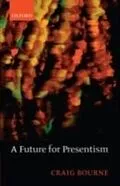How can we talk meaningfully about the past if it does not exist to be talked about? What gives time its direction? Is time travel possible? This defence of presentism - the view that only the present exists - makes an original contribution to a fast growing and exciting debate.
Zusammenfassung
Presentism, the view that only the present exists, was a much neglected position in the philosophy of time for a number of years. Recently, however, it has been enjoying a renaissance among philosophers. A Future for Presentism is meant as a timely contribution to this fast growing and exciting debate. After discussing rival positions in the philosophy of time, in Part I Craig Bourne shows how presentism is the only viable alternative to the tenseless theory of time. He then develops a distinctive version of presentism that avoids the mistakes of the past, and which sets up the framework for solving problems traditionally associated with the position, such as what makes past-tensed statements true, how to give the proper semantics for statements about the future, how to deal withtranstemporal relations, how we can meaningfully talk about past individuals, and how causation can be accommodated. Part I concludes with a discussion of the direction of time and causation, the decision-theoretic problem known as 'Newcomb's problem', and the possibility of time travel and causal loops. InPart II Bourne focuses on the problems for presentism raised by relativity theory. He begins with by giving a self-contained exposition of the concepts of special relativity that are important for understanding the later discussion of its philosophical implications. The last two chapters explore the philosophical implications of certain cosmological models that arise from general relativity, namely the expanding models, which seem to represent our universe, and Gdel's infamous model,which allows us to take a journey into our future and arrive in our past. The necessary physics is explained with the aid of diagrams, throughout.
Zusammenfassung
Presentism, the view that only the present exists, was a much neglected position in the philosophy of time for a number of years. Recently, however, it has been enjoying a renaissance among philosophers. A Future for Presentism is meant as a timely contribution to this fast growing and exciting debate. After discussing rival positions in the philosophy of time, in Part I Craig Bourne shows how presentism is the only viable alternative to the tenseless theory of time. He then develops a distinctive version of presentism that avoids the mistakes of the past, and which sets up the framework for solving problems traditionally associated with the position, such as what makes past-tensed statements true, how to give the proper semantics for statements about the future, how to deal withtranstemporal relations, how we can meaningfully talk about past individuals, and how causation can be accommodated. Part I concludes with a discussion of the direction of time and causation, the decision-theoretic problem known as 'Newcomb's problem', and the possibility of time travel and causal loops. InPart II Bourne focuses on the problems for presentism raised by relativity theory. He begins with by giving a self-contained exposition of the concepts of special relativity that are important for understanding the later discussion of its philosophical implications. The last two chapters explore the philosophical implications of certain cosmological models that arise from general relativity, namely the expanding models, which seem to represent our universe, and Gdel's infamous model,which allows us to take a journey into our future and arrive in our past. The necessary physics is explained with the aid of diagrams, throughout.
Titel
Future for Presentism
Autor
EAN
9780191526558
ISBN
978-0-19-152655-8
Format
E-Book (pdf)
Hersteller
Herausgeber
Genre
Veröffentlichung
18.06.2009
Digitaler Kopierschutz
Adobe-DRM
Anzahl Seiten
256
Jahr
2006
Untertitel
Englisch
Unerwartete Verzögerung
Ups, ein Fehler ist aufgetreten. Bitte versuchen Sie es später noch einmal.
